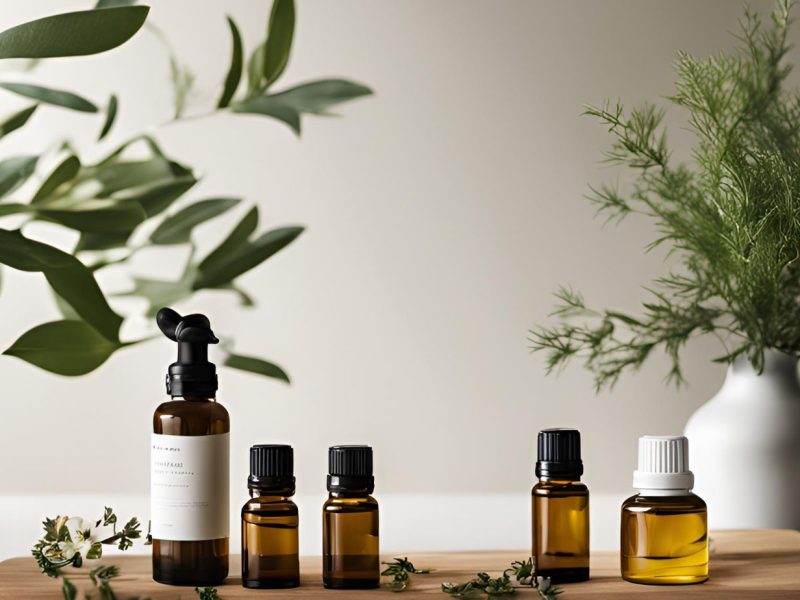Essential oils have gained immense popularity in recent years, thanks to their numerous health benefits and versatile uses. Whether you’re looking to reduce stress, improve sleep, or simply add a pleasant aroma to your home, essential oils can be a wonderful addition to your wellness routine. This beginner’s guide to aromatherapy will help you understand what essential oils are, how they are made, and the basics of using them safely and effectively.
What Are Essential Oils?
Essential oils are concentrated extracts derived from the leaves, flowers, stems, bark, or roots of plants. These oils capture the plant’s natural fragrance and beneficial properties. The most common methods of extraction include steam distillation and cold pressing.
How Are Essential Oils Made?
- Steam Distillation: This is the most common method, where steam is passed through plant material. The steam causes the essential oil to evaporate. The vapor is then cooled and condensed back into a liquid, separating the oil from the water.
- Cold Pressing: Typically used for citrus oils, this method involves mechanically pressing the plant material to release the essential oils.
Benefits of Essential Oils
Essential oils offer a wide range of benefits, including:
- Stress Relief: Oils like lavender, chamomile, and bergamot are known for their calming properties.
- Improved Sleep: Essential oils such as lavender and cedarwood can promote better sleep.
- Enhanced Mood: Citrus oils like orange and lemon can uplift and energize.
- Skin Care: Tea tree, frankincense, and rose oils can improve skin health.
- Respiratory Support: Eucalyptus and peppermint oils can help clear congestion.
How to Use Essential Oils
There are several ways to use essential oils, each offering different benefits:
- Diffusion: Using an essential oil diffuser, you can disperse the oil into the air. This method is excellent for creating a calming atmosphere, improving mood, and purifying the air.
- How to Use: Add water to your diffuser according to the manufacturer’s instructions, then add a few drops of your chosen essential oil.
- Topical Application: Applying essential oils directly to the skin can provide targeted benefits. However, it’s crucial to dilute them with a carrier oil to prevent skin irritation.
- How to Use: Mix a few drops of essential oil with a carrier oil like jojoba, coconut, or almond oil. Apply to areas such as wrists, temples, or the soles of your feet.
- Inhalation: Inhaling essential oils directly from the bottle or using a steam inhalation method can provide quick relief for respiratory issues or stress.
- How to Use: For steam inhalation, add a few drops of essential oil to a bowl of hot water. Cover your head with a towel and inhale the steam for a few minutes.
- Baths: Adding essential oils to a warm bath can enhance relaxation and soothe sore muscles.
- How to Use: Mix a few drops of essential oil with a carrier oil or Epsom salts before adding to the bath to ensure even distribution.
Safety Tips for Using Essential Oils
While essential oils are generally safe, it’s important to use them correctly to avoid adverse reactions:
- Dilution: Always dilute essential oils with a carrier oil before applying them to the skin.
- Patch Test: Conduct a patch test by applying a small amount of diluted oil to your skin to check for any allergic reactions.
- Quality: Choose high-quality, pure essential oils from reputable sources to ensure safety and effectiveness.
- Storage: Store essential oils in a cool, dark place to maintain their potency.
- Consultation: If you are pregnant, nursing, or have any medical conditions, consult with a healthcare professional before using essential oils.
Getting Started with Essential Oils
For beginners, it’s best to start with a few versatile essential oils that offer a range of benefits. Here are some suggestions:
- Lavender: Great for relaxation, sleep, and skin care.
- Peppermint: Useful for headaches, digestion, and respiratory support.
- Lemon: Energizing and perfect for cleaning and mood enhancement.
- Tea Tree: Excellent for skin issues and as a natural antiseptic.
- Eucalyptus: Ideal for respiratory problems and muscle relief.
Conclusion
Essential oils can be a valuable addition to your wellness toolkit, offering natural solutions for a variety of common issues. By understanding the basics of what essential oils are, how they’re made, and how to use them safely, you can confidently begin your journey into the world of aromatherapy. Start with a few essential oils, experiment with different methods of use, and enjoy the myriad benefits they have to offer. Happy aromatherapy!


